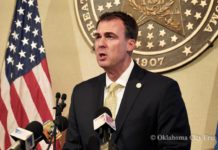OKLAHOMA CITY — A former Epic Charter School official charged in a major embezzlement and racketeering case said Friday he agreed to testify against the school’s co-founders in exchange for no prison time.
Joshua Aaron Brock, 42, who served as Epic’s chief financial officer, said he would receive 15 years of probation if he pleads guilty and cooperates with the prosecution. He would be a convicted felon under the agreement.
Brock’s testimony began Friday against Benjamin Scott Harris, 48, and David Lee Chaney, 44, in a preliminary hearing in Oklahoma County District Court.
Brock, Harris and Chaney have been charged with racketeering, multiple counts of embezzlement, conspiracy to defraud the state, acquiring unlawful proceeds and money laundering, among other accusations.
Harris and Chaney have denied misusing taxpayer funds from the virtual charter school, which during the COVID-19 pandemic became the largest public school system in the state.
Eight witnesses, many of them officials involved at Epic and investigators, spent hours testifying this week as prosecutors from the state Attorney General’s Office laid out their case to special judge Jason Glidewell.
The judge will decide after the hearing concludes whether the evidence is sufficient to advance Harris and Chaney toward trial.
The preliminary hearing didn’t finish as scheduled Friday, and the defendants’ attorneys said their schedules are too full to continue into next week. The judge set the hearing to resume May 7-8.

Harris and Chaney founded Epic, which opened in 2011, and they owned the company that managed the school for a decade. The company, called Epic Youth Services, earned 10% of the school’s annual revenue, a fee structure that generated tens of millions of dollars in profits for Harris, Chaney and Brock.
Brock, who held a 10% stake in the company, was the chief financial officer for both the school and the business.
“That would not be consistent with what I would call internal controls,” Brock said of his dual role.
Brock’s testimony described a mantra of “minimize expenses, maximize profit” that he, Harris and Chaney followed while operating Epic.
With this mindset, the co-founders and Brock leveraged Epic to expand their business to California at the cost of Oklahoma taxpayers and relied on state-funded school employees to do work their private company was being paid to do, he said
Brock testified he filed false invoices with Epic to mislead the Oklahoma State Department of Education. The invoices claimed the co-founders’ company was owed reimbursement for services it never actually provided to the school, such as charging for child nutrition costs at a school that offered no food service, Brock said.
Brock said he and Harris developed a template of service fees to charge to Epic, and he used this template to produce the false invoices. He said this was done to justify the company’s 10% management fee and to comply with a state law that required the expenses to be itemized.
Harris’ attorney, Joe White, contended his client “did not know the falsity” of the invoices Brock filed.
After state auditors began investigating Epic in 2019, the co-founders funneled millions of dollars from one business to another in hopes of concealing records and creating “an added layer” between their profits and the school being audited, Brock said.
Epic severed its relationship with the co-founders and Brock in May 2021.
Although Epic’s governing board was the highest authority at the school, the co-founders acted as the top decision-makers through their influence over daily operations and by leveraging personal connections with the board members, said Jimmy Harmon, chief of the attorney general’s criminal division.
“Mr. Harris and Mr. Chaney controlled the school, while maybe not on paper, but they controlled it in actuality,” Harmon said during the hearing. “They picked the board members. They told the board members what to do.”
The school board agreed to put the co-founders’ company in charge of Epic’s Learning Fund.
The Learning Fund account held millions of dollars intended to help Epic students pay for the curriculum they learned from, as well as technology and extracurricular activities.
Harris and Chaney’s attorneys said the money in the Learning Fund was private and could not be embezzled because the company was the owner of the bank account.
Brock, though, said he agreed with the prosecutors’ stance that the company was only a steward of the funds. He said it was public money intended for Epic students, not for he, Harris and Chaney to spend freely.
Bank records show the co-founders and Brock used the account to make personal purchases, give political donations and fill their company’s operating account when it ran low, said officials from the Oklahoma State Auditor and Inspector’s Office.
“It was concerning because these funds in the student Learning Fund were designated for the students for educational purposes,” auditor Salesha Wilken said on the stand Wednesday. “They were presented that way throughout the process until we questioned the accuracy of these transactions.
“These are public monies. These were for the kids.”
Despite contending the funds were private, the co-founders never reported the money as income in their tax returns, and purchases from the account used the school’s tax-exempt status, investigators said.

Chaney, his wife and his assistants spent $817,000 in personal purchases with credit cards that were charged against the Learning Fund, records show. Chaney reimbursed some of the funds from his personal bank account, but $377,000 was never repaid, auditors said.
Investigators also reported Harris, Chaney and Brock spent money intended for Oklahoma students on a charter school in California that their company also managed.
Brock testified Harris told him to transfer money to the California school so it could make payroll.
Meanwhile, Epic employees in Oklahoma were doing administrative work for the California school, according to testimony from multiple witnesses.
Jeanise Wynn, Epic’s current head of finance, said Epic has never been fully repaid for the work its employees in Oklahoma did for the California school.
Brock agreed. He said Harris ensured the California school paid back only a fraction of the reimbursements it owed.
Wynn said on Tuesday she also was concerned to see state-funded school employees managing the Learning Fund, a job EYS was being paid to do.
Epic paid millions of dollars in payroll for these Learning Fund managers, but no one outside of the co-founders’ company was allowed access to the account’s records, Wynn said.
The state auditor’s office raised similar concerns when it released the findings of its investigation into Epic in 2020. With the help of the OSBI, state auditors later obtained bank records of the Learning Fund and the co-founders’ company, which they alleged had uncovered more wrongdoing.
Defense attorneys spent hours questioning auditors and the OSBI’s lead agent in the case this week.
White, Harris’ attorney, said the co-founders deny the auditors’ allegations that public school funds were misspent.
“We’re going to dispute it all the way to trial,” White said.
Republished in partnership with Oklahoma Voice under Creative Commons license CC BY-NC-ND 4.0. Oklahoma Voice is a part of States Newsroom which is a nonprofit news network supported by grants and a coalition of donors as a 501c(3) public charity. Oklahoma Voice maintains editorial independence. Contact Editor Janelle Stecklein for questions: [email protected]. Follow Oklahoma Voice on Facebook and Twitter.

Nuria Martinez-Keel covers education for Oklahoma Voice and can be found at @NuriaMKeel on X (Twitter). She worked in newspapers for six years, more than four of which she spent at The Oklahoman covering education and courts. Nuria is an Oklahoma State University graduate.











